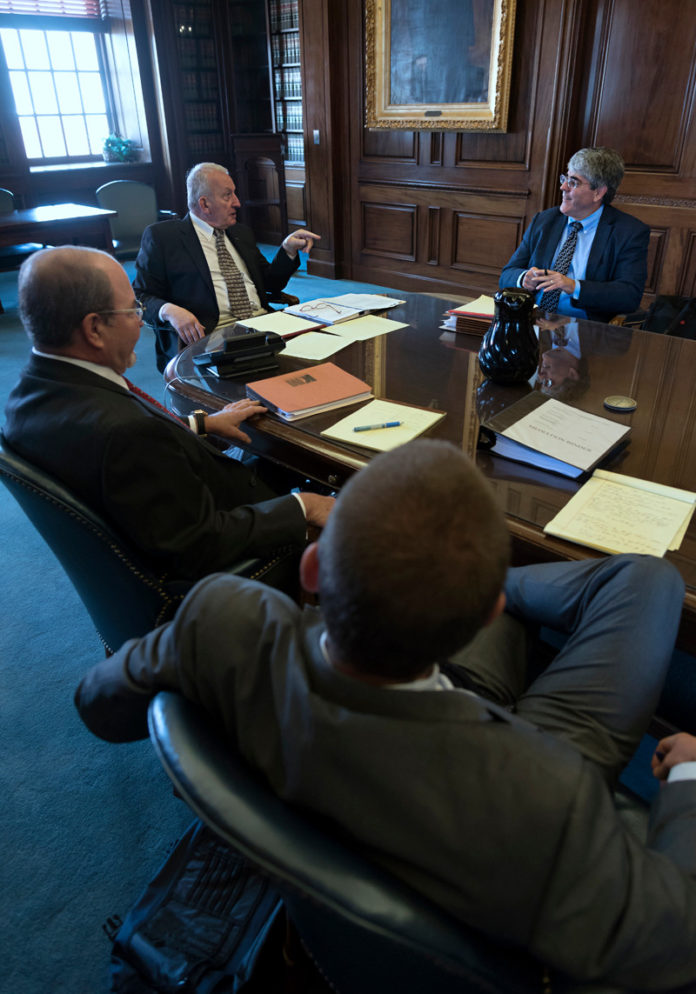
In some civil court cases, justice is meted out when a judge hands down an order, identifying a clear winner and a loser.
In other cases, the end result comes through mediation, a gradual and secretive process that often ends in a negotiated settlement, with all of the parties getting something out of the deal.
In Rhode Island, mediation this year has been used to settle or begin to bring resolution to several high-profile cases.
Litigation over state and municipal employee and retiree pensions, over the collapse of 38 Studios and other highly charged, complex cases have been handled by retired Supreme Court Chief Justice Frank J. Williams.
Williams continues to work as a mediator, sometimes through formal court appointments, such as the 38 Studios and pension cases, and sometimes by being contacted directly by clients.
In a recent interview, he explained how the process works, or doesn’t work, depending on the case. He would not discuss specifics of continuing cases.
Williams, who started the state court-mediation program, called the Appellate Mediation Program, while serving as chief justice, says mediation can reduce costs and expenses associated with the traditional trial process, primarily because the mediator serves at no cost.
“We don’t get expenses. We don’t get staff,” Williams said. “The whole idea was to keep the cost down for the litigants.”
And it can result in a settlement in which all parties walk away with something.
Most types of civil cases in Rhode Island can be mediated, Williams said, including large, complicated cases with multiple parties or millions of dollars at stake.
Another retired state judge who continues to work in mediation is Mark A. Pfeiffer, who retired in 2009 as a Superior Court associate justice. He is now mediator for a dispute in Providence involving a reorganization by Mayor Jorge O. Elorza of Fire Department platoons. He previously was the first receiver for the city of Central Falls, after it filed for bankruptcy.
The challenge of mediation is getting parties, who may be arguing over several issues, to find common ground.
“What I like about it is it’s an interesting process to try to get parties to talk to each other, to work with each other,” Pfeiffer said.
In Rhode Island, the most common types of cases that lead to mediation include contract disputes, personal-injury matters, property issues and collections, according to Craig N. Berke, a state court spokesman.
Eighty-eight cases were eligible for mediation in 2014, and of those, 46 were mediated. Of the mediated cases, 16 resulted in settlements and another seven were withdrawn, resulting in a disposition rate of 50 percent.
Most mediations take place over one or two sessions, with the average session lasting a little more than an hour. Only 7 percent of mediations take more than three hours total, Berke reported.
Some cases prove more difficult than others.
The mediation process brings people to the table together, but the mediator does not force parties to settle or reach a conclusion. Williams typically starts each mediation case with a private sit-down with the attorney and clients for each side, followed by a meeting attended by all of the parties.
Earning everyone’s trust is critical, he said, along with a sense that everyone will be treated fairly. Most of the time, the people on opposing sides meet at the mediation session together.
Sometimes, the animosity makes that difficult. By the time a mediator is involved, there may have been previous, unsuccessful attempts to settle the case, Williams said.
“First of all, you have to gain their trust,” he said. “You speak to them in a way that is approachable, that you can share with me what’s on your mind, what’s your concern, what are the parameters.”
The mediation sessions are private. They are not recorded by the court personnel. And the privacy is beneficial to the process, according to Williams, because it allows people to pose alternatives and come to agreement.
The settlement itself will be made public if it is reached.
“The problem is the ‘negatives’ are just that. We explore lots of options before we come up with a resolution. Many of these options are just intolerable. It’s best that you don’t rub their noses in it. It’s best left on the table.”
The cases that cannot be mediated will proceed to trial. Clients know they have that as an option, but the idea behind mediation is to begin to accept that you can live with something less than “winning.”
In order for mediation to have a chance, Williams said, “They’ve got to at least have the beginning of a mindset, ‘I’m open to a resolution, to come in at less than I really think I deserve.’ ”
Williams, who promoted mediation during his own judgeship, has patience when he knows the parties are open to agreement. Sometimes it takes a while. The longest mediated case he recalls took several sessions over the course of a year.
It involved a property dispute and condominium owners.
“It’s an issue of getting so many people, collected together, to agree,” he said. •











